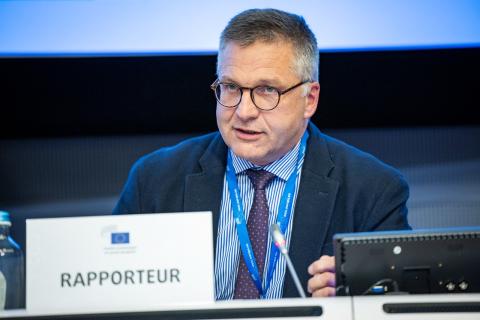European Economic
and Social Committee
Shaping the future of European agriculture: the EESC calls for resilience and sustainability
The European Economic and Social Committee (EESC) aims to lay the groundwork for a post-2027 common agricultural policy (CAP) that is resilient and sustainable and meets the needs of both farmers and society. The Belgian Presidency of the Council of the EU has tasked the EESC with formulating an opinion on how to achieve strategic autonomy and sustainable food production. The opinion adopted at its January plenary session.
The EESC considers that the post-2027 CAP must provide a stable long-term policy framework geared towards sustainable food production and open strategic autonomy for the EU, while protecting the diversity of farming types in the EU and meeting societal and ecological needs ("public money for public goods"), alongside ensuring rural development.
The challenge ahead is to strike a balance that ensures food security, protects the environment and promotes the well-being of European farmers in the face of evolving global challenges.
The EU's agricultural sector is characterised by a high prevalence of family farms, comprising 94.8% of all farms in 2020. Despite the numerical dominance of family farms, large farms cultivate the majority of agricultural land. Meanwhile, the sector is grappling with various problems: farmers' incomes are 40% lower than those in non-agricultural sectors, there are a shrinking number of farms, generational renewal is proving a challenge (only 6.5% of farm managers are under the age of 35) and there has been a substantial outflow of the labour force over the past decade.
Despite the fact that the share of the EU budget allocated to the CAP has fallen continuously over the past 40 years, being less than 25% in 2021, we strongly believe that CAP funding must be commensurate with its ambition to support a sustainable transition. The basic income support based on surface area should be gradually replaced by financial incentives to farmers for environmental and social services, with a reasonable transition period that may go beyond the scope of one single multiannual financial framework,
said Stoyan Tchoukanov, rapporteur of the opinion.
Small family farms should have the flexibility to choose their preferred support model during a reasonable transition period. To prevent further declines in the number of farms, the CAP must take action on access to land, favourable investment conditions, upskilling, empowerment of women and improved long-term prospects for farmers
, he added.
Inflation, unpredictable energy markets and the impact of climate change mean that EU farmers do not always have fair living standards. With the 2024 European Parliament elections on the horizon, the EESC sees an opportunity to shape the post-2027 CAP, addressing the evolving needs of society and agriculture.
The CAP should ensure decent working conditions in the sector, promote consumer demand for healthier and more sustainable diets, reduce food waste and regulate food markets to counter financialisation, ensuring that Europeans have access to affordable and nutritious food.
In light of energy price hikes and supply disruptions, the CAP should include counter-cyclical components and investment support for renewable energy production in rural areas. The EESC suggests reinforcing public/private partnership insurance schemes in CAP instruments after 2027 to address the consequences of extreme climate conditions. Investment support for innovation and digital technologies should be prioritised to empower farmers, reduce the environmental impact and enhance accessibility to remote areas.
The administrative burden should be minimised as much as possible, and the process of designing and adapting strategic plans should involve stakeholders, offer flexibility for Member States and allow for faster adaptations after initial approval. (ks)
